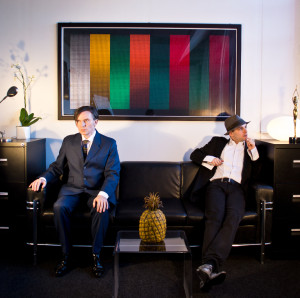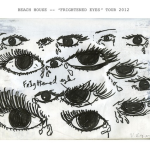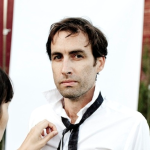And it’s a musical.
About the 1980s miner’s strike.
Think it sounds like a bad idea?
Well don’t worry, so does he.
Russell Senior was always an Awkward Pulp. Following their huge mid 90s successes, he left the band in January 1997 during the sessions for future single ‘Help the Aged’ because, “previously, the music always came collectively, from creative clashes, but I think Jarvis believed his own press and suddenly he was coming in with his own tunes. I didn’t think Help the Aged was worthy of following Common People,” he told the Guardian in 2009.
This tension was nothing new, however. A mid-80s interview released by Paul Mills’ Premspeak label and recently re-circulated captures a sparring Jarvis Cocker and Russell in full glory when discussing a 1983 Pulp gig that took place shortly before Russell joined the band:
Jarvis: “That was probably the best concert that that line-up played. That was quite good.”
Russell: “I saw that concert and I thought they’d utterly sold out. Crap. They should have split up. Really hated it. You know, they’re very good songs and all that kind of thing, but it didn’t mean owt.”
Jarvis: “Yeah, well it did mean something to me.”
When Russell joined Pulp later that year, he took them from the singer songwriter style naivety (and, “crap”) of ‘My Lighthouse’ and ‘Love Love’ on the ‘It’ debut album to the discordant, atonal post-punk noise of ‘Tunnel’, ‘They Suffocate at Night’ and his own anti-fascist rant, ‘The Will to Power’. Acclaim followed. Sales didn’t.
Russell wrote and sang other songs within Pulp, too. These aren’t the ones that appear on best-ofs. He set the ancient poem ‘To His Coy Mistress’ to a soundtrack of a plinking synth and drum rolling cacophony, he wrote and sang the ‘Freaks’ album’s nightmarish ‘Fairground’ and ‘Pick Me Up! Magazine’s future headline story, ‘Anorexic Beauty’ before then indulging his burgeoning passion in Eastern European folk punk with the thigh-slapping ‘Srpski Jeb‘, the sound of which when, combined with Jarvis’ new interest in Eastern European Disco signposted the way towards Pulp #4 with such Eastern European epics as ‘Love is Blind’ and ‘Don’t You Want Me Anymore‘.
And when Jarvis discovered House Music, Russell continued to play his violin all over the top of it and then delivered his own bleak, dissonant, creeping take on the new movement with ‘This House is Condemned’ which provided the climax to the ‘Separations’ LP.
And when Pulp went properly pop with Babies, Razzmatazz, Lipgloss etc. Russell was still there, playing his guitar lines that sometimes fit and sometimes jarred pleasantly, his violin parts that lifted some of the songs of this era to greatness and that ever-present deathly stare from behind his epic collection of sunglasses. Thus, whilst Jarvis got the crowd going, “people’d be dancing, but there’d be a pool of emptiness in front of me, with people looking terrified. I started wearing sunglasses so I wouldn’t disconcert people,” as he drily told Select in 1994.
But there was another side to Russell too, for the above chronology isn’t quite as straight forward as it may seem. When the lineup that performed ‘It’ fell apart in 1983, there was far from an immediate segue to the Russell era of Pulp. For, instead of performing new songs onstage, the remnants of that lineup began performing, instead, as actors in Russell’s plays.
Those two remaining members, Jarvis and drummer Magnus Doyle, along with new recruit Tim Allcard (on hunting horn and poetry, of course) and Russell formed a performance collective called ‘The Wicker Players’ and performed Russell’s plays ‘The Fruits of Passion’ and ‘The Wicker Players Christmas Panto’ in 1983 at venues including Sheffield’s Crucible Theatre, followed by ‘The Wicker Players Mystery Event’ in 1985 and a final performance at Sheffield Polytechnic at the end of 1986 (alongside Jarvis and ‘Captain Sleep’ playing “the daft disco songs” that would later go on to form much of Separations).
And now, after a quarter of a century, there’s a new play from the hand of Russell and his present-day collaborator, Sheffield-based DJ and former Kings Have Long Arms musician, Ralph Razor . The play is called ‘Two Tribes’ and it is, as the headline above promised you, a play about the 1980s miners’ strike.
So, just why has it taken 25 years to write a follow up play? “I never thought I’d write a play again,” states Russell seated in the office space in central Sheffield that the two are renting for the duration of the project, “I’d concluded that – to use the language of the mid-eighties – theatre was ‘bourgeois’ and wanted to get into something with a bit more bite, which being in a band certainly had.”
“Two Tribes” is a departure from Russell’s earlier work in that, “there’s very little if any surrealism in the play” which may well come as a disappointment for those wanting to see a return from characters such as Authoritarian #1 and Authoritarian #2 or scenes such as Jarvis eating a plate of (fake) dog shit at a job interview, but there is a potential sop to those clamouring for the wilfully odd Senior of old in that, “we are contemplating putting on ‘a cross between an installation, a disco and a seaside attraction’ in the run-up which would have something for those of the Dadaist persuasion.”
Or is he joking? Does he joke?
Originally, when Ralph first pitched the ‘Two Tribes’ idea to Russell, the latter stated that he thought it was a “ridiculous idea, and I want no part of it”. Now however, he “still has that reluctance, but sometimes you just have to get something down and see how it goes. I’m not sure who else is going to tell this tale and it’s a tale worth the telling.”
The enormous chronological gap between his plays has given Russell room to move away from seeing it as a continuation of his previous work in that he “can’t really think of any” lessons to be learnt from his earlier pieces. However, he does not that “the only time a play didn’t really ‘work’ was in the Crucible Theatre… so avoid theatres is maybe [a lesson to be learnt]… I dunno, ask me one on sport! Oh actually I’m a Blades fan… so maybe not.”
Oh! He does joke! The interviewing of this somewhat daunting character might be less traumatic than I had previously thought. Maybe we can even get away with asking something about Pulp later without getting stared at until we wither.
For now though, and given that this interview is being given in relation to ‘Two Tribes’, I was interested in how the concept of a “musical about the miner’s strike” could be sold to a hypothetical ‘battle hardened ex-miner’ who might think that ex- pop stars and DJs should something they know nothing about well alone. Russell opines that “it’s a big story and there’s room for all different ways to tell it, this is just one. And it isn’t compulsory. I’d hope our ‘battle-hardened ex-miner’ was as friendly as the ones I met during the strike…there was an awful lot of humour around at the time and it would be a misrepresentation to exclude that and get too po-faced about it.”
Ralph Razor agrees, and also has a line with which to sell the play; “’Two Tribes’ is a musical for people who don’t like musicals. We bring all the songs into it in a plausible way and in realistic settings; i.e. if someone does break into song, they do so in at a place/time when they could feasibly break into song and there’s no big cheesy chorus line dance numbers. We’re primarily using the hits of the time but haven’t ruled out using some original music in some way. We also plan to heavily re- work certain tracks into sort of musique concrete by creating layered soundscapes of domestic, industrial or other related sounds. There are elements of humour, and some camp moments but it’s not a high camp farce or send up of the strike, it has plenty of grit and it dramatises the main events and tells the story in a sensitive and respectful way.”
“With the current political climate of high unemployment, strikes, a Conservative government and public sector spending cuts the Miners’ Strike couldn’t be more relevant.”
“There is also a certain charm in taking a rag-tag bunch of misfits, whipping them into shape and creating something brilliant, in which the whole is greater than the sum of its parts; but we are definitely not against casting experienced and possibly named actors. It’s more about getting actors who are right for the play. We are based in Sheffield, and intend to launch ‘Two Tribes’ in Sheffield, and the play is based in South Yorkshire and North Nottinghamshire so it makes sense to cast actors from the local area.” Russell agrees and points out that “it’s more likely you can find someone who can do the accent and feel the feelings round here.”
Ralph further states that “writing a musical isn’t really much different to putting on a club night. It’s all about creating a concept and choosing which songs to play, and when to play them, and then actually doing it and seeing it through,” and Russell says that “it’s always 90% perspiration. There’s the pub-talk, which is easy and then there’s the turning up and doing it, which is hard. I can confirm that people in the art world are still, for the most part, unreliable fuckwits who prefer the former to the latter.”
At the present time, Ralph states that “the script is ready to be developed and work- shopped with actors, and we have had quite a bit of interest already from directors and producers so watch this space.” Russell clarifies that “though most of the writing is done I’d say 90% of the work is still ahead of us because we’d like to do it in a particular style.”
The writing of the play was started early last year. Since then, both Russell and Ralph (with the latter acting as the former’s PA) were involved in 2011’s hugely successful Pulp reunion tour, although they avoided the Australian and Eastern European dates due to Russell’s fear of flying. Before the tour, “We were fairly close to finishing the play,” says Ralph, “We had completed the first act (of two), and had written about half of the second act with the rest in draft form. We also had quite a bit of word of mouth interest and momentum by that point so after the tour was over, we decided to pick things up again.”
They hadn’t been able to work on the play on tour due, Russell says, to being in
a “different headspace entirely…where are my Kumquat’s peasant?! I said fresh ice – not this frozen rubbish!”
Given that Pulp are continuing to tour this year, but without Russell’s involvement, are we to take from that that this play means more to you than the idea of continuing to play with Pulp does?
“I guess it’s new over old. Doing the Pulp thing as a special event was a blast, but I wouldn’t want to make a career out of it. That way sadness lies.”
“Doing the Pulp tour hasn’t altered the approach [to the play] as far as I can see, although the strike certainly influenced my approach to the business of being in a band. In a way it’s a similar thing you strive for, to reach that tipping point where people lose sense of self and become part of a crowd, which has its own mass consciousness…well that’s on a good day anyway, and there were some good days, even this time round there was definitely a sense of communion at times and that’s a precious thing.”
You mention the strike changing your approach to the band. What were your views on the situation at the time? Presumably you probably hold quite hardline views on [then Labour Leader Neil] Kinnock’s attacking of [National Union of Mineworkers President] Scargill for refusing to hold a ballot of the miners and thus denying them the blanket of legality that they would otherwise have had. Do you think Scargill was right to do this? Do you think it likely the miners would have voted to strike if they had been ballotted?
“Kinnochio is the reason I don’t vote Labour anymore. Ugh,” explains Russell. “I think they would certainly have voted to strike. It wasn’t actually Scargill’s idea not to have a national ballot, but he’s a democrat and was bound to do what the union decided. Even if they’d had a National ballot and won, then the Notthingham thing [in which the Nottingham branch of the NUM broke away from the National NUM as they disagreed with the decision to strike without a ballot] would have happened because they’d have been doing divide and rule. Like when Ireland voted for independence and they said after the event that 6 counties hadn’t so they could split off.”
Ralph believes that the miners “probably would have [voted to strike], although I suppose by not doing so, Scargill left himself open to criticism.”
Russell’s viewed on Kinnock/Scargill have remained unchanged during the writing of the play. “During the strike I was able to observe Arthur Scargill at close range. What is remarkable about him is that he is totally unremarkable, just an ordinary bloke with a daft sense of humour. He had no discernable charisma offstage, but put him in front of his people where he becomes the conduit for their mood then you are dealing with something electric.”
Finally, I was intrigued as to how Russell had taken the news that the old Sheffield NUM headquarters was to be turned into a Casino. Do acts like this make him think that it’s more important than ever for the world to see the play, or does it make him worry that people don’t care about the miners’ strike anymore?
“I think that they are knocking too many buildings down, so a change of use is better than that, then in a hundred years time the building and its ghosts will still be there. I used to go wandering round Middlewood mental asylum (as an ‘urban explorer’ –not a patient) and there was an amazingly strong atmosphere. Then they turned it into apartments and somehow it was hard to believe it was even the same building because the atmosphere had gone. It was very sad…but one has to be grateful for small mercies. A rainforest will regrow but Victorian England will never come back, so these things are priceless treasures. Do you know that there are absolutely no cutlery factories left in Sheffield anymore… and they are knocking them down like skittles? Oh what was the question?”
I’m not sure anymore. I can’t get the image of Russell as an urban explorer in some sort of horror film environment out of my head.
‘Two Tribes’ is set to be debuted (in part) at this year’s Sheffield Tramlines Festival in mid-July.





